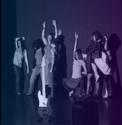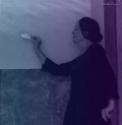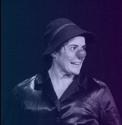re.act.feminism #2

A performing archive is part of the long-term project re.act.feminism.
Since 2008, re.act.feminism explores feminist and gendercritical performance art from the 1960s to the early 1980s as well as the ‘return’ of this artistic practice in the form of re-enactments, re-formulations and archival projects.
For the full programme of "re.act.feminism # 1: performance art of the 1960’s and 70’s today" please click here
Performance art developed into an independent art form in the 1960’s & 70’s, firmly establishing the body and actions of the artists and audiences involved as a medium of art. It has been in great demand for a number of years. This is partially motivated by the historisation of this ephemeral art form as well as the active appropriation of its history by a younger generation exploring the relevance of a potentially resistant, subversive artistic practice today.
In the context of the current trend of historicising and institutionalising performance art, our goals are:
- To investigate feminist, gendercritical and queer strategies within performance art, which set the tone for this medium from the beginning.
- To go beyond current strategies of canonization and stress the diversity of performative practices and correcting blind spots.
- To create a critical and thematic cartography to promote a transcultural and cross-generational dialogue.
- To highlight the complex relationship between live performances, their traces and documents, and their reception.
The works in the archive have been chosen based on their potential and relevance for today’s feminist and queer debates and artistic strategies. They allow us to see the power relations inscribed in the body as well as its potential for resistance and for pleasure, and to discover singular subjectivities and connections between life and art.
The project is based on the idea of a living archive, emphasizing the use, appropriation, and re-interpretation of documents: What effect does the performance document have in the moment of its reception, what does it do? What kind of relationship does it create between the past and the future, between its author and recipient? What types of references, new relations and future potentials does the archive offer?
re.act.feminism takes us therefore on a time travel, inviting us to engage in a lively dialogue beyond the limits of time and space. Our focus is not on historical reconstruction, but rather on ‘infecting’ gestures and productive translations.
The completion of the project is set for the summer of 2013 in Berlin, where the results of the preceding trajectory and the research by partner institutions will be presented. Furthermore, a bilingual exhibition catalogue, documenting the entire project, will be published.




